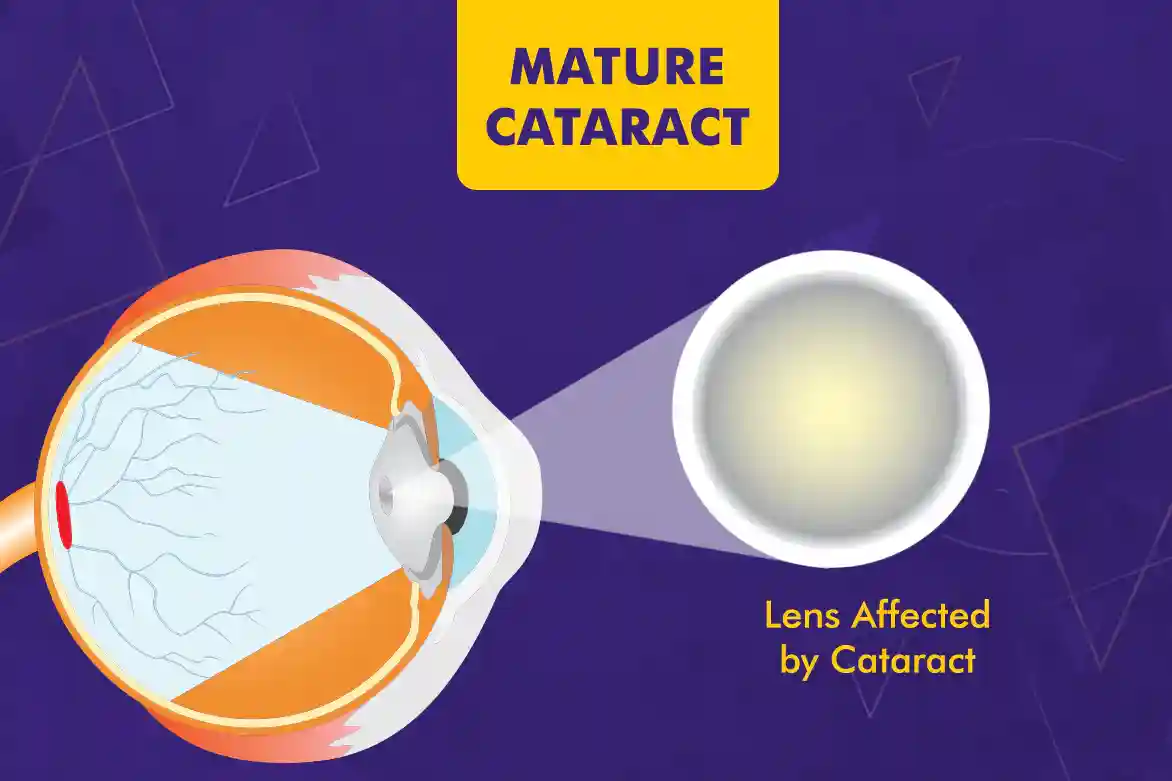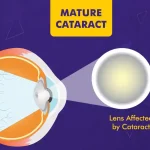What is a mature cataract?
A mature cataract refers to a fully developed cataract where the lens has turned completely opaque, significantly impacting vision. It occurs when proteins in the lens degrade and accumulate, obstructing the passage of light. Unlike an early-stage cataract, where some transparency remains, a mature cataract entirely prevents light from reaching the retina, leading to severe vision loss.
Mature cataract meaning
The term “mature cataract” indicates that the cataract has progressed to a stage where the entire lens is cloudy. This condition prevents light from passing through and forming clear images on the retina. Patients with mature cataracts may only be able to differentiate between light and darkness without the ability to recognize objects or details. The progression from an immature to a mature cataract can take years, depending on individual health factors.
Learn about the difference between mature and immature cataracts.
Causes of mature cataracts
Several factors contribute to the development of a mature cataract, including:
- Aging: The most common cause, as proteins in the lens break down over time, leading to clouding.
- Diabetes: High blood sugar levels can cause sugar deposits in the lens, accelerating cataract formation.
- UV Exposure: Prolonged exposure to ultraviolet (UV) radiation from the sun can lead to oxidative damage to the lens proteins.
- Smoking and Alcohol Consumption: Both contribute to oxidative stress and damage to lens fibers, increasing the risk of cataract formation.
- Eye Injuries and Trauma: Blunt or penetrating injuries to the eye can accelerate cataract formation by causing lens damage.
- Prolonged Use of Steroids: Certain corticosteroids, when used over a long period, can increase susceptibility to cataracts.
- Genetic Factors: A family history of cataracts can increase the likelihood of earlier cataract development.
Symptoms of mature cataract
Mature cataracts cause pronounced vision impairment. Common symptoms include:
- Blurry or Obstructed Vision: Complete loss of clear vision due to a fully opaque lens.
- Difficulty Recognizing Faces and Objects: Even from a short distance, familiar objects may appear unrecognizable.
- Increased Sensitivity to Bright Light and Glare: Sunlight or artificial lights may seem overly bright or produce discomfort.
- A Visible Whiteness or Cloudiness in the Pupil: The lens takes on a whitish or brownish hue, noticeable to others.
- Loss of Contrast Sensitivity: Differentiating between similar shades or textures becomes challenging.
- Absence of an Iris Shadow: Since no light passes through the opaque lens, there is no shadow formation on the iris.
Why is iris shadow absent in mature cataracts?
In an immature cataract, some light still passes through, creating an iris shadow when examined using a slit lamp. However, in a mature cataract, the lens becomes fully opaque, preventing any light from passing through. As a result, the iris shadow is absent because no light can be refracted or dispersed within the eye. This absence is a key diagnostic feature used by ophthalmologists to differentiate between mature and immature cataracts.
What does ripe cataract mean?
A “ripe cataract” is an older term used to describe a mature cataract that has reached a stage where surgical removal is necessary. It signifies that the cataract has fully developed, leading to severe vision impairment. The term was historically used to determine the optimal time for cataract surgery, but modern surgical advancements allow removal at earlier stages.
Mature cataract colour and its significance
The colour of a mature cataract typically varies from white to deep brown. The variation depends on the type of cataract:
- White Mature Cataract: Indicates total opacification of the lens, often seen in advanced cortical cataracts.
- Brown (Brunescent) Cataract: Occurs in nuclear cataracts and can make surgery more challenging due to lens hardening.
- Milky or Grey Cataract: Common in certain metabolic disorders, leading to rapid lens opacification. Understanding the colour helps ophthalmologists plan the most effective surgical technique for lens removal.
Treatment options for mature cataract
The primary treatment for a mature cataract is cataract surgery, which involves replacing the cloudy lens with an artificial intraocular lens (IOL). The main procedures include:
- Phacoemulsification: Uses ultrasound waves to break the cataract before removal, performed through a small incision.
- Extracapsular Cataract Extraction (ECCE): Suitable for dense cataracts, requiring a larger incision to remove the opaque lens in one piece.
- Intracapsular Cataract Extraction (ICCE): A rarely used technique where the entire lens and capsule are removed.
Risks and complications of untreated mature cataract
If left untreated, mature cataracts can lead to:
- Blindness: Complete loss of functional vision.
- Lens-induced Glaucoma: Increased intraocular pressure causing optic nerve damage.
- Intraocular Inflammation: Leading to pain, redness, and possible infection.
- Difficulty Performing Daily Activities: Severely impacting independence and quality of life.
Recovery and aftercare post-cataract surgery
Post-surgery recovery is generally smooth with proper care. Key aspects include:
- Avoiding strenuous activities for at least four weeks.
- Using prescribed eye drops to prevent infection and inflammation.
- Protecting eyes from bright light with sunglasses.
- Following up with the ophthalmologist for regular check-ups.
Prevention and eye care tips
While aging-related cataracts cannot be entirely prevented, certain measures can delay their onset:
- Wearing UV-protective sunglasses.
- Managing diabetes effectively to prevent metabolic cataract formation.
- Maintaining a diet rich in antioxidants like vitamin C and E.
- Avoiding smoking and excessive alcohol consumption.
- Regular eye check-ups for early detection.
Conclusion
Mature cataracts cause severe vision impairment and require surgical intervention for visual restoration. Early detection and timely treatment can prevent complications. Regular eye check-ups and protective measures can help maintain eye health and delay cataract progression.
Regain Clear Vision with Expert Care Schedule a Consultation Today!
FAQs
What is Mature Cataract?
A mature cataract refers to an advanced stage of cataract development, where the lens becomes significantly cloudy, causing severe visual impairment.
What is maturation of cataract?
A Mature cataract is opaque, which totally obscures the red reflex. Cataracts progress to a mature stage due to the gradual opacification of the lens, resulting in dense cloudiness that blocks the passage of light.
How do you treat mature cataracts?
Mature cataract treatment is surgical intervention, where the clouded lens is removed and replaced with an artificial intraocular lens.
What are the risks associated with untreated mature cataracts?
Untreated mature cataracts can lead to worsening vision, increased sensitivity to glare, and a significant impact on daily activities, affecting overall quality of life.
What are the surgical options for treating a mature cataract?
The primary surgical option is cataract surgery, often performed using phacoemulsification, a technique that uses ultrasonic energy to remove the cloudy lens and replace it with an artificial intraocular lens.
How much does treating mature cataracts cost?
At Centre For Sight, the cost typically starts at an affordable price of 20,000 only; however, the overall Mature cataract treatment cost varies based on factors like, chosen treatment technique, location, surgeon experience, and additional services.
Is mature cataract curable?
No, a mature cataract is not curable but the natural lens can be replaced with an artificial lens through surgery for vision improvement.
What is the difference between mature and hypermature cataracts?
Hypermature cataracts are a form of last-stage cataract progression that can lead to a variety of complications like complete vision loss.
How does a mature cataract affect vision?
A mature cataract causes severe vision impairment by making the lens completely opaque, leading to blurred vision, difficulty recognizing objects, and increased sensitivity to light.
Can a mature cataract be treated without surgery?
No, once a cataract has matured, surgery is the only effective treatment. Non-surgical methods may slow progression but cannot restore vision.
How long does it take to recover from mature cataract surgery?
Most patients recover within a few weeks, but complete healing may take up to a month. Post-surgery care, including eye drops and avoiding strenuous activities, is crucial for proper healing.
What happens if a mature cataract is left untreated?
Untreated mature cataracts can lead to blindness, lens-induced glaucoma, and intraocular inflammation, significantly affecting quality of life.
Is cataract surgery painful?
No, cataract surgery is performed under local anesthesia, making it painless. Patients may experience mild discomfort or irritation during recovery, which typically subsides within a few days.





